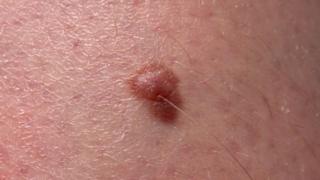Melanoma blood test: Scientists unveil 'world-first' research Australia ...
Australia Australia Melanoma blood test: Scientists unveil 'world-first' research
 Image copyright BSIP/Getty Images
Image copyright BSIP/Getty Images Australian scientists say they have developed a blood test to detect melanoma in its early stages.
The test, billed as a world first, is designed to make it easier to spot the skin cancer before it becomes fatal, according to researchers.
Currently, doctors rely on skin examinations and biopsies to detect melanoma, which can spread quickly.
Researchers say the blood test could provide more accurate results than the human eye, and save many lives.
Developed by scientists at Edith Cowan University, the test picks up melanoma by recognising auto-antibodies produced by the body to combat the cancer's early growth.
In a trial involving about 200 people - half of whom had the cancer - the test was successful in 81.5% of cases.
It will now undergo clinical trials, to take place within three years, in a bid to improve its accuracy to 90%. Researchers hope it could be approved for use within five years.
Early detection
Malignant melanoma, the most serious form of skin cancer, is mainly caused by ex posure to UV radiation. It often starts with a change in a mole or a new growth on skin.
While specialists are well-trained to spot melanoma, Prof Mel Ziman, head of the research team, said the blood test could hasten diagnosis.
- What is malignant melanoma?
- Drug gives '40% skin cancer survival'
- 'Exciting' test spots cancer a year early
"Often in routine clinical practice, it can be a little difficult to tell an early stage melanoma from a mole," she told the BBC.
"This blood test will fit in when the patient goes to the clinic to determine whether the lesion is a melanoma. The physician could do the test first before feeling like they have to do a biopsy."
The study initially examined 1,627 functional proteins. After analysis, researchers identified 10 auto-antibodies that best indicated the presence of melanoma.
Prof Ziman said detecting melanoma early was critical.
"If we can remove the melanoma when it is less than 1mm thick, you have a 98-99% chance of survival," she said.
"As soon as it spreads further into the skin, survival rates drop dramatically."
Melanoma accounts for the most skin cancer-related deaths, according to the World Health Organization, and is one of the most common cancers for young people.
In Australia, where incidence rates are highest, about 1,500 people die from melanoma each year.
The test will not pick up other types of skin cancers such as squamous cell and basal cell carcinoma, researchers sai d.
Health experts have urged people to keep checking their skin.
"The false positive and false negative rates of this test mean that the results will need to be interpreted with caution and, where practical, combined with a full skin check by a dermatologist," Prof Rodney Sinclair, a University of Melbourne dermatology expert, told Australian Associated Press.
The research was published in the journal Oncotarget.
Top Stories
Trump attacks Putin summit 'haters'The US president blames "Trump Derangement Syndrome" for criticism of the Helsinki summit.
18 July 2018 Thai boys relive 'moment of miracle' 18 July 2018 Spain's new sub 'too big for its dock' 18 July 2018Features
My life trapped in an American city
Heatwave reveals hidden UK landscapes
US boss gives car to 20-mile walk worker
Did Qatar pay the world’s largest ransom?
Hoping for change in Africa's last one-pa rty state
Las Vegas hotel sues shooting victims
VideoB usiness booming for giant cargo planes
Video'I survived the bombing of the King David Hotel'
Rose gold: The fashion trend that just won't go away
Elsewhere on the BBC
Football phrases
15 sayings from around the world
Full article Football phrases Why you can trust BBC NewsBBC News Services
- On your mobile
- On your connected tv
- Get news alerts
- Contact BBC News





No comments